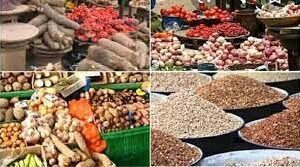With the constant embarrassing rejection and banning of Nigeria’s agricultural produce in the European market, due largely to lack of proper verification and approval by the relevant agencies, the federal government has set up a Standing Inter-ministerial Technical committee on zero rejection of agricultural commodities and produce/non-oil exports. JOHN OBA reports
Standardization, especially on consumables is an area no serious country will dare handle with levity, hence the constant rejection of Nigeria agricultural produce by the European Union.
This has agitated many concern Nigerians, though to same, it is a deliberate wish-hunt while others thinks it is an over bearing posture of the EU, yet very few especially under the current administration has come to term with the fact that Nigeria value is embarrassingly being put refuted by a more conscious minded partner that wouldn’t toy or risk the life of its citizens.
It could be recalled that the EU, had extended the ban of Nigerian beans for another three years into the EU markets while the Head of Trade and Economic Section of the EU delegation to Nigeria, Filippo Amato said the ban would remain until substantial guarantees are provided that adequate official control systems have been put in place.
Concern Nigeria would wonder that despite the fact that Nigeria has several regulating and standardizing agencies responsible for regulation and monitoring of exportation of Nigeria agricultural products such as Nigeria Custom Service, National Agency for Food and Drug Administration and Control (NAFDAC), National food control, Standards Organisation of Nigeria, Federal Department of Fisheries, Nigeria Agricultural Quarantine Service (NAQS), Consumer Protection Council (CPC) among many others, Nigeria still have sub-standard produce being taken out of it shore without the know of all these agencies.
But the constant rivalry within these agencies saddled with this very important assignment has brought this country more shame than expected. The show of superiority and better than thou attitude of agencies like the Nigeria Custom Service and the Nigeria Agricultural Quarantine Service (NAQS) has made them to forget that Nigeria should come first in whatever responsibility they are saddled with.
While the federal government is busy seeking for measures to ensure the non-rejection of Nigeria’s agricultural produce and commodities, these agencies are occupy with argument on who should be the queen of the ports.
The recent exchange between the national coordinator of NAQS, Dr. Vincent Isegbe, and the Deputy Controller-General, Nigeria Customs Service, Abubakar Umar, during the high level meeting on the validation of Nigeria’s strategy for a single quality control management system and plan for zero reject of agricultural commodities and produce/non exports in Abuja on agencies and personnel that ought to be at the ports revealed clearly while dubious companies exporting ban products out of the country are slipping through their hands.
While Isegbe is stressing need for the representatives of the service to be stationed at the seaports to inspect export commodities, Umar is saying there is no need to crowd the ports, yet calling for a holistic reform efforts.
Isegbe, expressed regret that the service was sidelined during inspection of export goods, saying that the development was the major reason for the rejection of the country’s produce. Umar called for the establishment of quality control laboratories at designated places to enable various agencies to certify the export commodities.
Umar said: “The federal government can designate areas where products can be inspected, container-sealed and escorted to the ship.
“We do not need to be crowded at the sea ports to do this work. There should be holistic reform efforts.’’
It took the Minister of Agriculture and Rural Development, Audu Ogbeh, wisdom to control the situation with the promised that the government will resolve the situation, while also giving assurance that government will make quarantine services available at all airports and seaports.
Bemoaning the situation, the Minister of state for agriculture, Senator Hieneken Lokpobiri, said: “At the validating meeting, I discovered that there was a lot of inter-agency revelry but at the end of the day the Vice President, gave the responsibility to the ministry of agriculture to coordinate all the relevant agencies with a view to come up with a road map that would be presented to him and to the federal executive council so that Nigeria will have a unified action plan which will make business easy for prospective investors.”
The concern is that, before this problem is resolved, there is the needs for the government to set up an urgent committee to ensure that necessary measure are put in place at the country’s various ports to stop and apprehend exportation of sub-standard non-oil products.
With the just validation of this strategic document embodied in two documents that includes the methodology of Conduit of Excellence (quality and safety controlled beans from Nigeria) and standard Operating Procedure Manual for zero reject for non-oil exported in Nigeria, a document containing the strategy and plan for a single control management system for zero reject of its agricultural commodities and produce by the government and which implementation will require active collaboration of these agencies.
It is necessary that the limit and extend of these agencies are properly set out and the number of personnel required at the port ironed out to give room for proper check and balances that stop the nation from unnecessary shame.
In a nation, where the welfare of the citizens is the major concern of all and the pride of the nation is worth fighting for, agencies ought to collaborate rather than unnecessary rivalry that further put the nation in disrepute.



